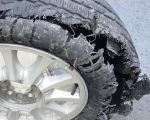Can I Continue Driving After a Flat Tire Repair?
- 1. Understanding Flat Tire Repairs
- 2. Can You Drive After a Flat Tire Repair?
- 3. How Long Can You Continue Driving After a Flat Tire Repair?
- 4. When to Seek Professional Assistance
- 5. Real-Life Experience with Flat Tire Repair
- 6. Choosing the Right Towing Service for Emergencies
1. Understanding Flat Tire Repairs
Flat tires are one of the most common vehicle issues that can occur at any time, often leaving drivers stranded or uncertain about what to do next. When you find yourself with a flat tire, the immediate question that comes to mind is whether it's safe to continue driving or if a more thorough repair is needed. Flat tire repairs can vary in severity, and knowing when and how to address them is essential for your safety and the longevity of your tire.
In my own experience, I’ve encountered several flat tire situations. The first time it happened, I wasn't sure if I should drive to the nearest service station or wait for help. After learning more about tire repairs, I realized that the approach depends on the extent of the damage and the tools at your disposal. Flat tire repairs can range from quick patch jobs to complete tire replacements, but not all repairs allow for continued driving immediately. Understanding this distinction can save you from further complications and even additional damage.
2. Can You Drive After a Flat Tire Repair?
Whether or not you can continue driving after a flat tire repair depends on a few critical factors. In some cases, a minor puncture or hole in the tire can be quickly patched, allowing you to drive for a short distance to a nearby mechanic or tire shop. However, this doesn’t mean you should take the car on a long drive, especially if the repair was done in an emergency situation.
One key thing to remember is that driving on a repaired tire is only safe if the repair was done correctly and the tire was not severely damaged. A proper repair, such as using a plug or patch, can be effective for short-term driving, but driving at high speeds or for long periods on a patched tire may compromise its integrity. After my own flat tire repair, I learned that it was best to keep driving speeds moderate and take the vehicle to a professional repair service as soon as possible.

MR. TIRE INC.
2078 New York Ave, Huntington Station, NY 11746, USA
Types of Flat Tire Repairs
There are a few different types of flat tire repairs, each with varying degrees of safety and longevity:

MR. TIRE INC.
2078 New York Ave, Huntington Station, NY 11746, USA
1. Temporary Tire Sealant
Some drivers use temporary tire sealant as a quick fix. This is ideal for small punctures, as the sealant can provide a temporary solution that lets you drive for a limited time. However, this is not a long-term solution, and you should visit a tire shop for a permanent repair or replacement as soon as possible.
2. Patching or Plugging
If the puncture is located in the tread of the tire and is relatively small, a tire patch or plug may be used. This repair allows you to continue driving for a short time, but it’s always recommended to have the tire properly inspected afterward. I’ve used a plug myself and managed to drive to the tire shop without issue, but I made sure to limit my speed and distance.
3. Tire Replacement
If the tire has significant damage, such as sidewall punctures or blowouts, it’s best to replace the tire entirely. Even after a temporary fix, it’s unsafe to continue driving on a tire that has been severely compromised. After one of my tires experienced a sidewall tear, I was reminded that tire replacement is sometimes the only option to ensure safety on the road.
3. How Long Can You Continue Driving After a Flat Tire Repair?
While driving on a repaired tire is possible, it’s essential to understand the limitations of the repair. As mentioned earlier, if the tire was patched or plugged, it is typically safe to drive for a short period. However, this period is not indefinite. I learned that driving on a temporary repair should only be done for short distances and at moderate speeds. Most tire experts recommend that you seek a more permanent fix or a replacement as soon as possible after a flat tire repair.
The rule of thumb is to drive for no more than 50-100 miles after a temporary repair. If you find yourself needing to drive farther, you should consider using a spare tire or calling for roadside assistance. I once used a tire plug to get to a tire shop 20 miles away, but I was cautious and made sure to keep my speed under 40 mph.
4. When to Seek Professional Assistance
While some flat tires can be repaired at home or with temporary fixes, there are situations where you should definitely seek professional assistance. If the damage is severe, if you’re unsure about the repair, or if you’ve been driving on a patched tire for an extended period, it’s time to call a professional. In my experience, calling a towing service for help was a smart choice when I was unsure whether my tire repair would hold. I was relieved to have professionals handle the situation, ensuring my safety on the road.
Here are some situations where seeking professional help is recommended:
1. Severe Tire Damage
If the damage to the tire is beyond a simple puncture or small tear, such as a sidewall blowout, you should not attempt to repair it yourself. In such cases, towing the car to a service center is the safest option.
2. No Spare Tire Available
If you don’t have a spare tire or it’s also damaged, calling for towing assistance is the best solution. I once found myself without a spare and had to call a towing service to get to a nearby shop.
3. Inability to Perform a Safe Repair
If you don’t have the proper tools to repair the tire safely, or if you’re in an unsafe location, it’s better to call for roadside assistance. It’s always better to err on the side of caution.
5. Real-Life Experience with Flat Tire Repair
Let me share a personal experience that highlighted the importance of getting help with a flat tire. I was on a road trip and got a flat tire late at night. I attempted a quick repair using a temporary sealant, but when I tried to continue driving, I realized that the tire didn’t hold up. I had no choice but to call a towing company for assistance. They were able to help me get to a nearby shop for a proper tire replacement. The whole experience taught me the importance of not pushing the limits after a quick fix and getting professional help when needed.
6. Choosing the Right Towing Service for Emergencies
In emergency situations like a flat tire, it’s essential to choose a reliable towing service. You want a service that is available 24/7, has a quick response time, and offers reasonable rates. I’ve found that having a trusted towing service available for those unexpected moments can take a lot of stress out of an emergency situation. In my case, I used Rescue & Towing, and they were prompt and professional, getting me back on the road quickly.
If you’re facing a flat tire and aren’t sure about your repair options, don’t hesitate to reach out for professional help. For reliable towing and roadside assistance, visit Rescue & Towing to learn more.


























